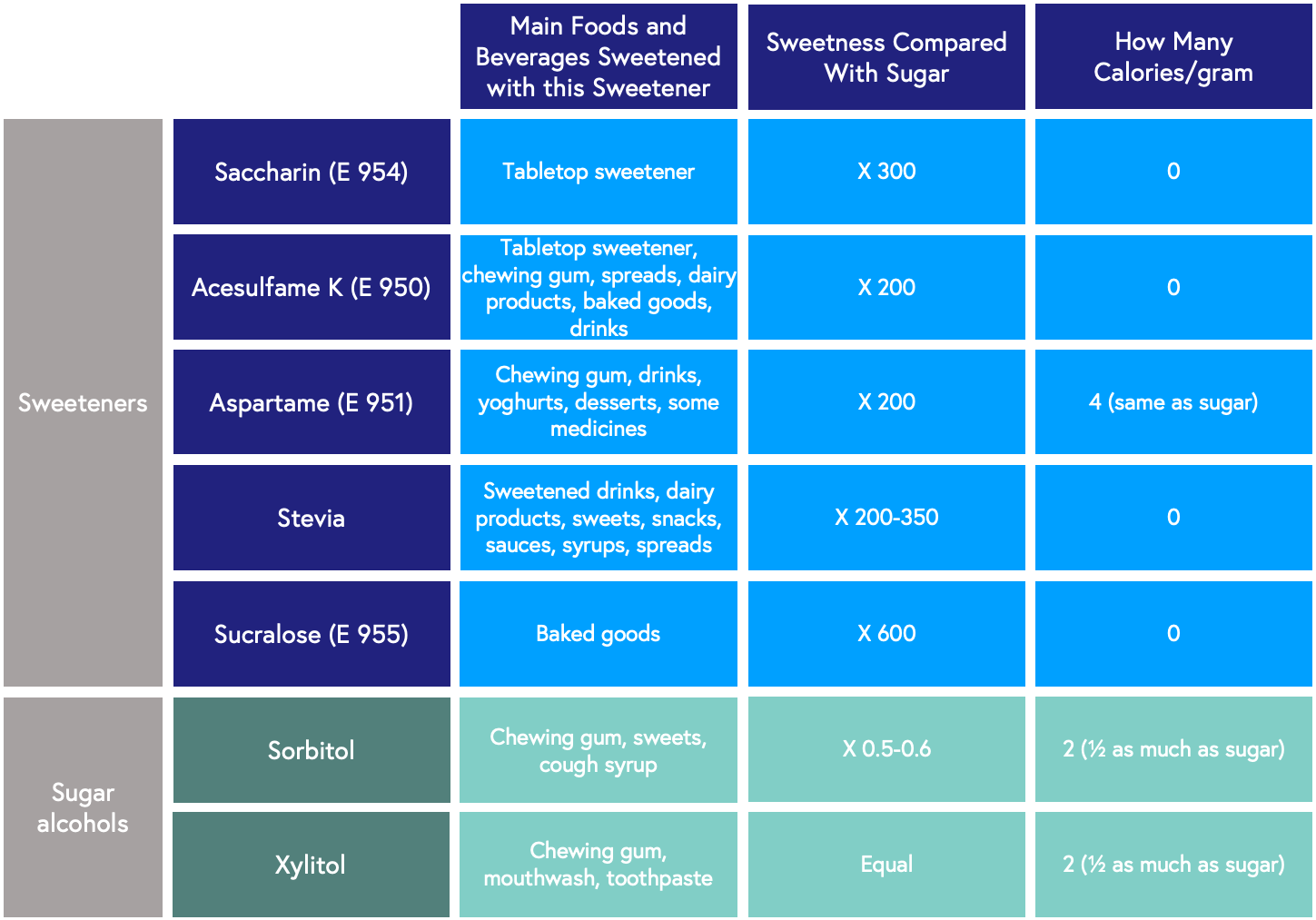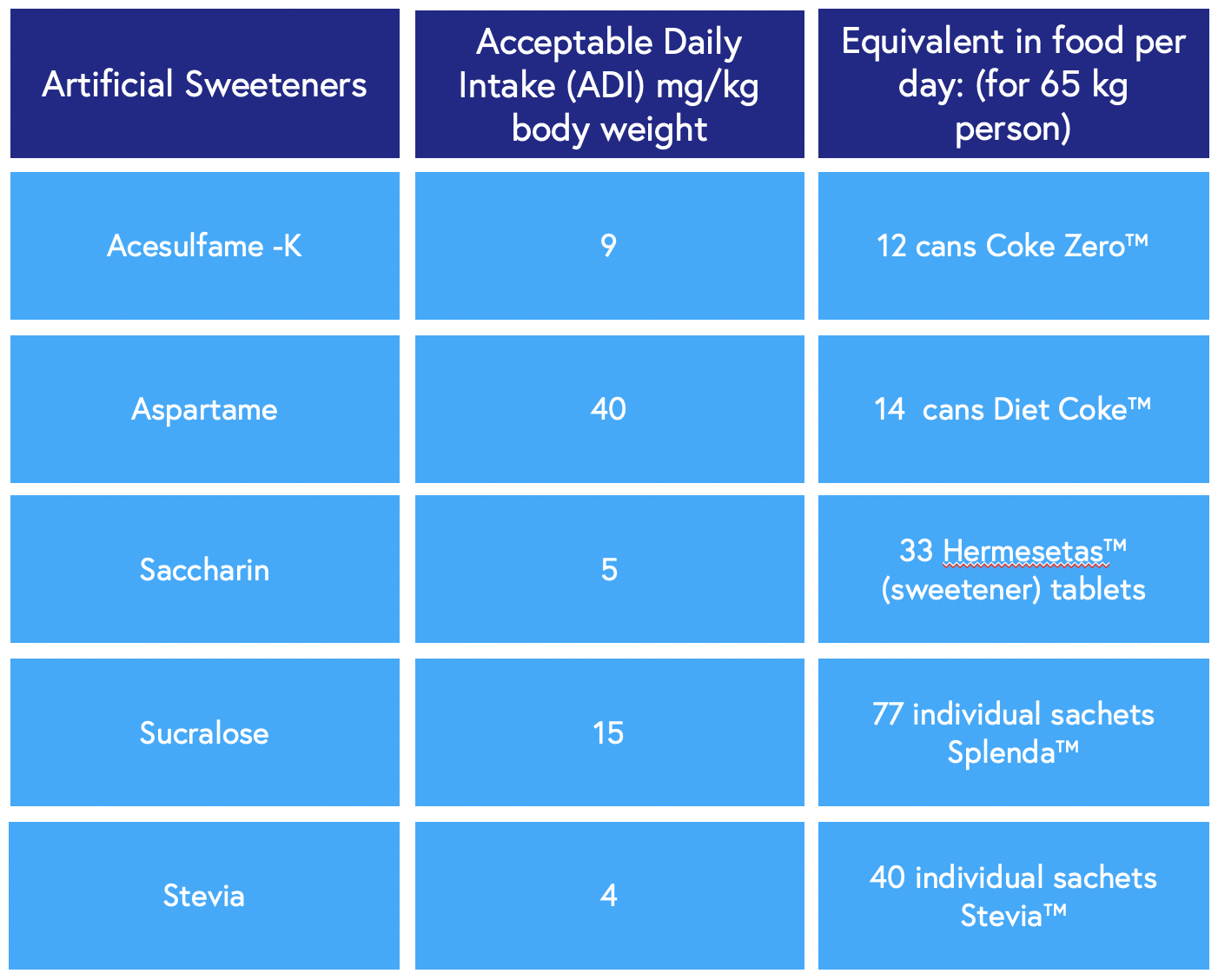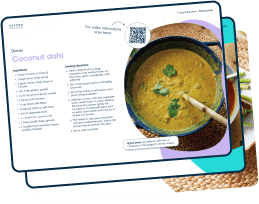We’re often told that we should limit our intake of sugary foods to maintain good health and lose weight. This has led to a surge in popularity for artificial sweeteners (also known as sugar substitutes).
Using artificial sweeteners is one way to reduce our sugar intake and lower our risk of dental decay. They also don’t affect blood sugar levels. However, it’s unclear as to whether artificial sweeteners have any health benefits.
Some studies have suggested that artificial sweeteners could be linked to health problems. There are also concerns that they reinforce the sweet taste, which might lead to cravings. This guide looks at the latest science behind artificial sweeteners.
Medication-assisted weight loss with a future focus
Start with Wegovy or Mounjaro, transition to habit-based health with our support


What are artificial sweeteners?
Artificial sweeteners are chemicals that are added to food and drink products to sweeten them. They are lower in calories compared with natural sugars like sucrose (table sugar) and fructose (fruit sugar) which, if eaten in excess, can lead to weight gain, increased risk of type 2 diabetes, and heart disease.
Artificial sweeteners provide the sweet taste but without the calories or an accompanying rise in blood sugar levels. Therefore, they are often popular with people who are trying to reduce their sugar intake, lose weight, or manage their blood sugar levels.
Key points:
- Artificial sweeteners are sugar substitutes that contain little or no calories.
- They’re often popular with people who are trying to reduce their sugar intake, lose weight, and manage their blood sugar levels.
Common types of artificial sweeteners

Key points:
- Common artificial sweeteners include Saccharine, Acesulfame K. Aspartame, Sorbitol, Sucralose, Stevia, and Xylitol.
- Artificial sweeteners are either used as tabletop sweeteners or added to foods such as chewing gum, sauces, dairy products, sweets, desserts, and drinks.
Where do the concerns come from?
Concerns about the safety of artificial sweeteners stem from the 1970s. Several animal studies found that when rodents were fed large doses of saccharin, over time, they developed bladder cancer. The researchers concluded that saccharin causes cancer in rodents and went on to say that it’s likely to cause cancer in humans too.
Additionally, rat studies have suggested that artificial sweeteners may have a negative effect on the balance of gut bacteria. However, research suggests that we can’t use animal models to predict how humans will respond to certain chemicals.
The amounts of artificial sweeteners used in the rodent studies are much higher than the amounts that humans would typically eat or drink. What’s more, there are major differences in how humans metabolise saccharin and develop cancer compared with rodents. This means that we can’t translate these findings to human health.
Observational studies have suggested that artificial sweeteners may cause weight gain, changes in gut bacteria, and even type 2 diabetes. However, these types of studies can only suggest an association (or correlation) between two variables. We can’t conclude from observational studies that sweeteners cause weight gain and type 2 diabetes.
Key points:
- Animal studies have suggested an association between artificial sweeteners and bladder cancer.
- Observational studies in humans have suggested an association between artificial sweeteners and weight gain, changes in gut bacteria and even type 2 diabetes.
- But we can’t conclude that artificial sweeteners cause these problems until we have higher-quality evidence.
What does the latest science say?
Artificial sweeteners and cancer
As mentioned above, animal studies have suggested that high levels of saccharin in mice could be linked to an increased risk of bladder cancer. However, animal data can’t determine that artificial sweeteners would have the same effect on humans.
More recently, the relationship between artificial sweeteners and cancer in humans has been thoroughly investigated. The researchers either found no association between saccharin and cancer or the studies were inconclusive.
A large epidemiological study (a type of observational study that investigates the distribution, patterns, and causes of diseases in populations) of nearly half a million adults found that saccharin isn’t associated with the number of bladder cancer diagnoses each year.
Smaller case-controlled studies (a type of observational study) have also found no significant association between cancer and artificial sweeteners. These studies are largely retrospective, which means they look backwards to see if there is a link between artificial sweetener use in people who already have cancer. However, there are limitations to this kind of study such as ‘recall bias’, where individuals may not be able to accurately recall how much sweetener they consumed.
Higher-quality systematic reviews, which included human clinical studies, have also failed to find a link between cancer risk and artificial sweetener use.
Key point:
- More recent and higher-quality studies have found that artificial sweeteners are unlikely to increase the risk of cancer in humans.
Artificial sweeteners and gut health
Our intestinal microbiota (gut bacteria) plays an important role in health. In 2014, research in rats suggested that artificial sweeteners may have a negative effect on our gut bacteria. However, as we’ve mentioned above, we can’t translate findings from animal studies to humans.
Some human studies have already been conducted, but they’re mostly observational or involving small numbers. Observational studies can, at best, suggest an association between artificial sweetener use and altered gut bacteria. So we can’t conclude from observational studies that artificial sweeteners caused these changes in gut bacteria.
Most artificial sweeteners aren’t broken down in the gut. This means that they, in theory, shouldn’t affect gut bacteria. Stevia, sorbitol, and xylitol, however, are broken down in the gut. Small human trials have shown that xylitol and stevia, but not sorbitol, may affect the gut bacteria. However, larger high-quality human trials are needed before we can draw conclusions.
Key points:
- Animal studies have suggested that artificial sweeteners may alter gut bacteria.
- However, findings from animal studies can’t be applied to humans.
- We need more high-quality studies to conclude whether artificial sweeteners change gut bacteria in humans.
Artificial sweeteners and body weight
Concerns about artificial sweeteners and weight gain originate from observational and population studies.
For example, a review of nine observational studies found that artificial sweeteners were associated with a raised body mass index (BMI). However, higher–quality studies have shown that there is very little evidence that using artificial sweeteners, instead of sugar, leads to weight gain.
Whilst most sweeteners don’t provide any calories, they reinforce the sweet taste. Sweeteners can be up to 500 times sweeter than table sugar, which puts the sugar receptors on our tongue into overdrive. Research is conflicting, although some studies have found that they may also have a stimulating effect on our appetite, which can leave us feeling hungry and unsatisfied. This could lead to sweet cravings, which may offset weight loss or health benefits, although more research is required.
Over time, frequent use may lower our tolerance for more complex tastes. Simply put, people who routinely use sweeteners may start to find that naturally sweet food, such as fruit, and unsweet foods, such as vegetables, becomes less appealing.
Key points:
- Research into artificial sweeteners and weight gain is conflicting.
- Recent and high-quality research suggests that artificial sweeteners don’t directly cause weight gain.
- Although they may increase appetite, which could offset weight loss or health benefits. More research is required.
Artificial sweeteners and type 2 diabetes
There have been concerns that long-term use of artificial sweeteners may cause type 2 diabetes.
Large population studies (prospective cohort studies) have found some associations between artificial sweetener consumption and increased risk of developing type 2 diabetes. However, self-reports of food and drink intake is notably unreliable. We can’t conclude from these types of studies that using artificial sweeteners causes diabetes.
Small, high–quality clinical trials in humans have found that artificial sweeteners don’t increase the risk of type 2 diabetes. However, larger clinical trials are needed.
Key points:
- Artificial sweeteners have been associated with an increased risk of type 2 diabetes. However, an association doesn’t prove causation.
- High-quality and large-scale clinical trials in humans are needed.
Safety of artificial sweeteners
The European Food Safety Authority (EFSA) conducts rigorous testing to determine the safety of artificial sweeteners in Europe. They say that artificial sweeteners are considered safe when added to food and drinks to approved safe levels.
The safe level is called the Acceptable Daily Intake (ADI). The ADI for an artificial sweetener is the amount that people can consume daily during their whole life without any appreciable risk to health. The ADIs for artificial sweeteners have been set at levels that are much higher than people would normally eat. For example, a 65 kg person could safely consume 2600 mg of aspartame per day, which is equivalent to 14 cans of Diet Coke™.
ADIs for several common artificial sweeteners:

Key points:
- The European Food Safety Authority (EFSA) rigorously assesses the safety of artificial sweeteners.
- They say that they’re safe when added to food and drinks to approved safe levels.
- Safe levels of artificial sweeteners are known as the Acceptable Daily Intake (ADI). ADIs have been set at levels that are much higher than people would normally eat.
Take home message
- Despite widespread concerns about the safety of artificial sweeteners, there isn’t any strong scientific evidence to suggest that they are unsafe.
- In the EU, artificial sweeteners are tightly regulated and undergo rigorous safety testing by the European Food Safety Authority (EFSA).
- The EFSA says that artificial sweeteners are safe and can be added to food and drinks to approved safe levels.
- Whilst sweeteners don’t provide many calories, they reinforce the sweet taste, which could lead to sweet cravings. They may also have a stimulating effect on our appetite, which can leave us feeling hungry and unsatisfied.
- People who consume sweeteners may end up replacing the lost calories through other sources, possibly offsetting weight loss or health benefits. There’s also inconclusive evidence about the long-term effects of artificial sweeteners.
- Over time, we want to retrain our taste buds to adapt to a less sweet taste. We recommend limiting your intake of sweeteners or being more mindful of how often and how much you have.


